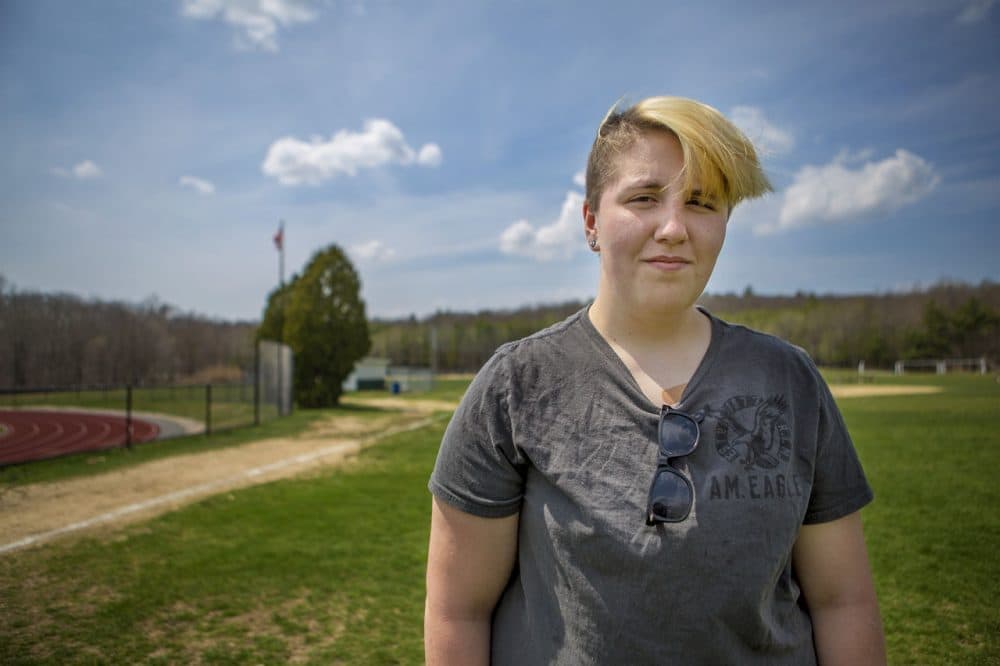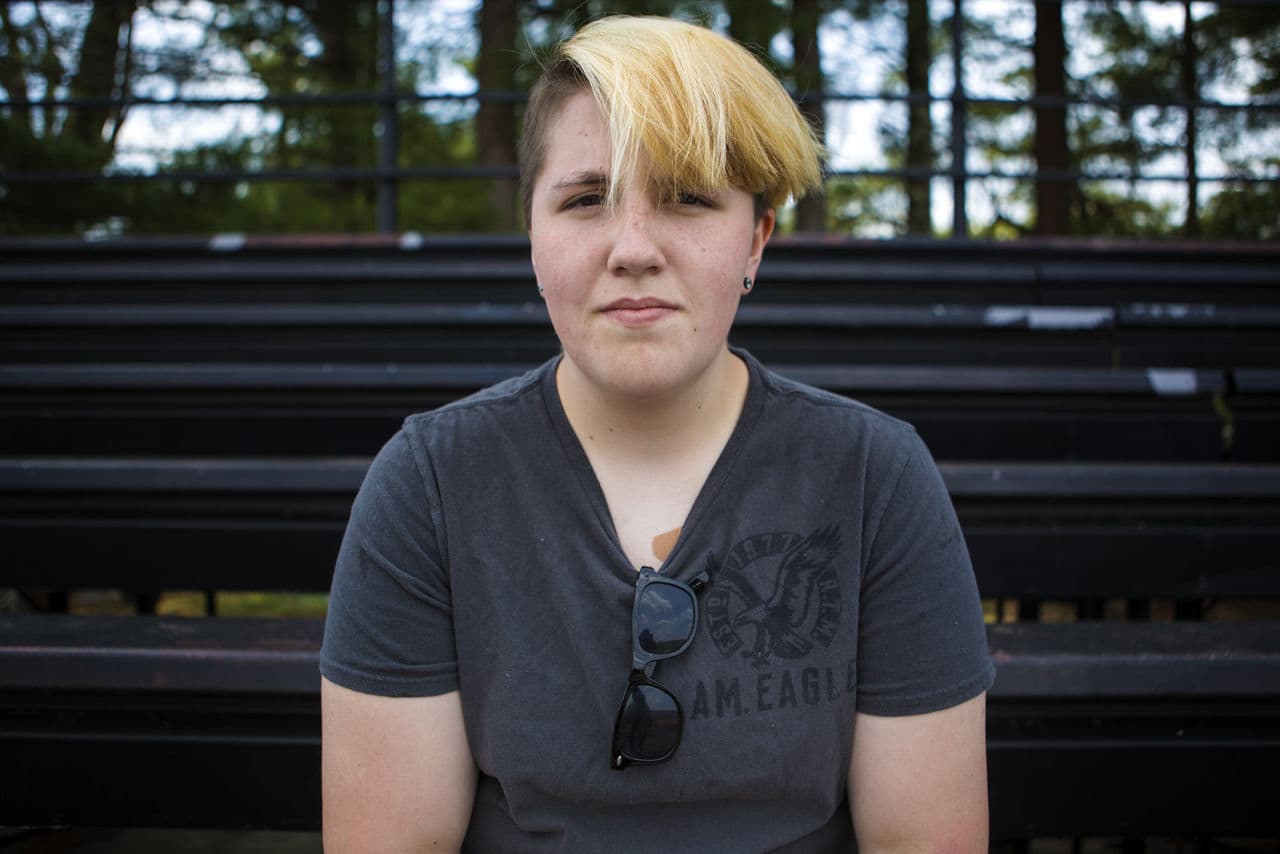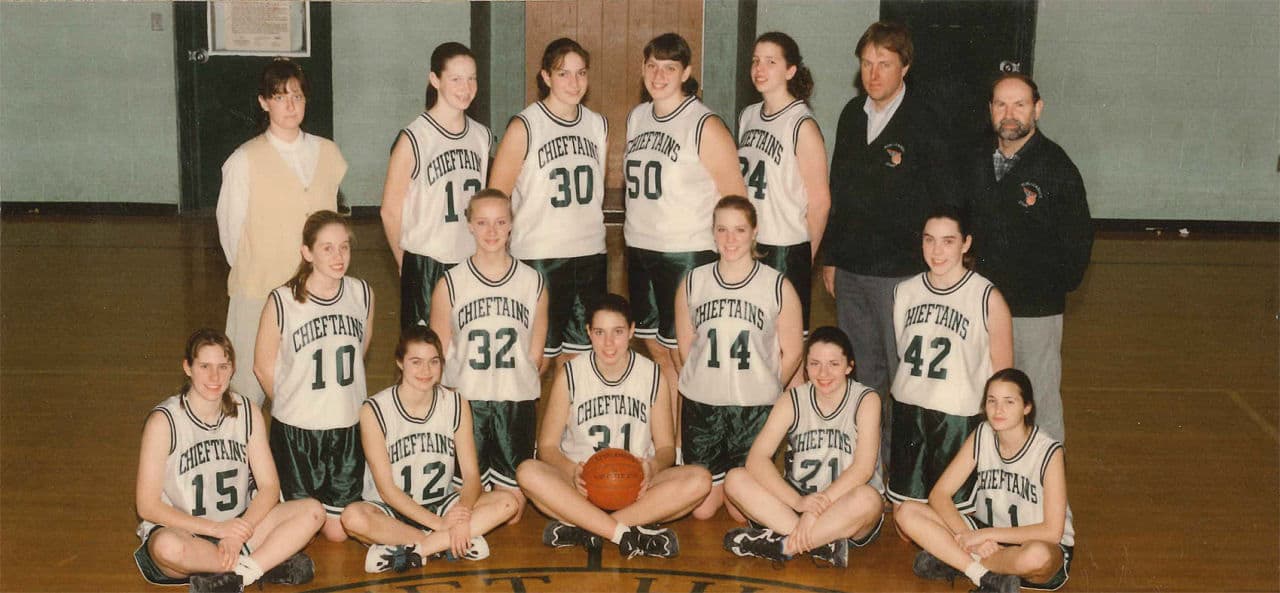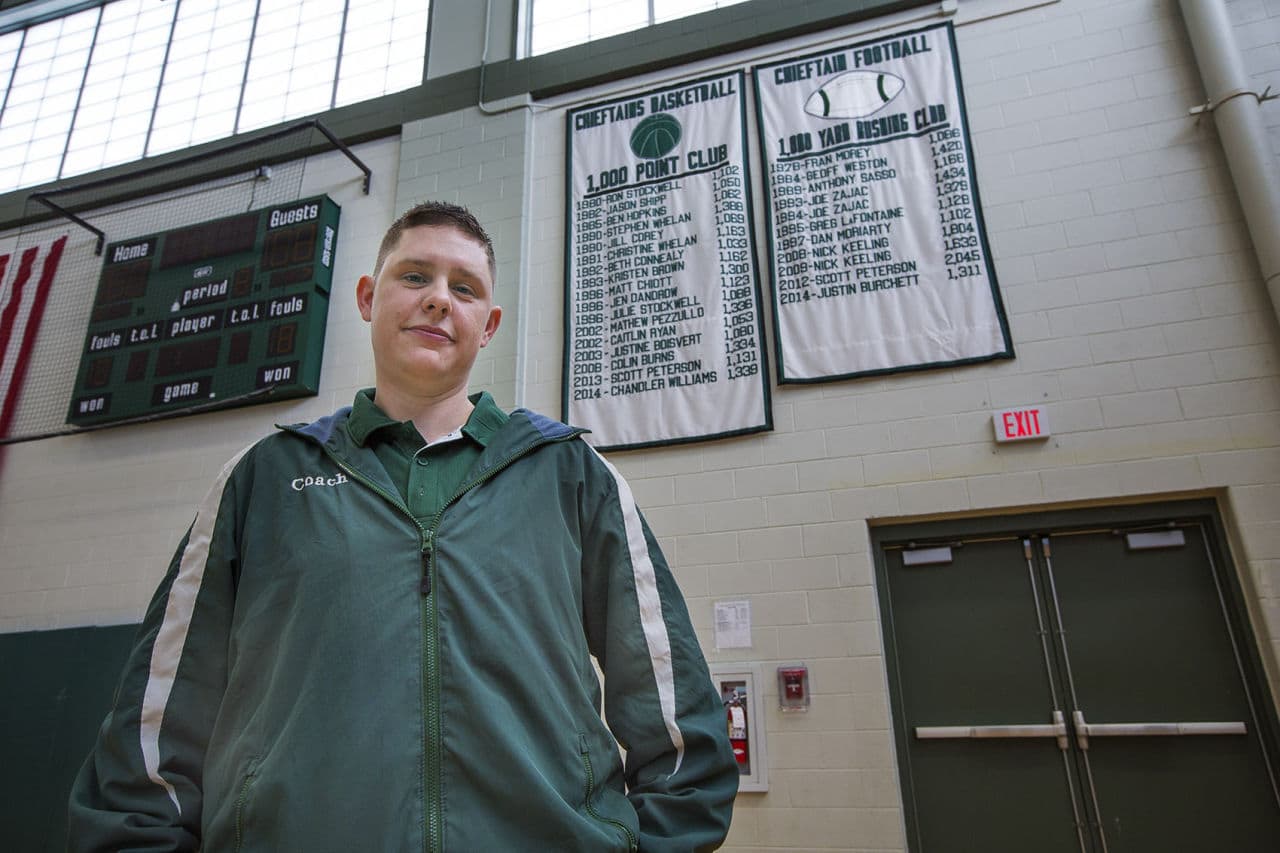Advertisement
Policies For Transgender High School Athletes Vary From State To State
Resume
Crack. A bright pink aluminum bat connects with a fluorescent yellow softball, sending it toward woods that border Ponaganset High School in northwest Rhode Island. The left fielder runs in and makes the catch.
"Two down ladies, two down," a player calls.
This is home field for Ponaganset’s Lady Chieftains, except, it seems, the team is not all ladies.
Justin Bonoyer, a stocky 5-foot-5-inch player with a shock of blonde hair, plays right field. Justin was Elise to his coaches until a few weeks ago, although he'd already come out as transgender to most of his teammates.
"I’m a guy," Justin says. "It’s the same as if a guy who’s not trans went and played on a girl’s softball team."
Well, sort of. There are separate rules for transgender athletes. Rules so different from state to state that some high school athletes like Justin can try out for any team they choose while others need sex reassignment surgery before they can sign up.
There's a lot of attention on bathrooms in the debate about transgender rights. The next battleground may be locker rooms, basketball courts and soccer fields. For high school students, the debate centers on Title IX, the federal law that bans discrimination based on gender. Does it also ban discrimination based on gender identity?
We'll lay out the arguments in a minute. First, a little more about Justin.
From Elise To Justin
Justin started telling close friends late last year that he was male. He came out to his mom one day in the dead of winter, at school.
Julie White was working the lunch line. She recalls leaning over the metal counter to greet her child who "walked up to me and said, 'Mom, I have something to tell you: I’m trans.' "
White did not expect the announcement, but looking back, she says there were signs: the Barbies Justin tossed aside in favor of building toys or mud pies, things White calls "boys' stuff." She shifts in her chair at a coffee shop to look at Justin.
"Everybody who knows you has said, ‘Oh I’m not surprised, I’m not surprised at all,' " White says. "Yeah," Justin agrees, with a nod.
Before Justin came out, friends had cheered as Elise joined the wrestling team and won a few matches against bigger, heavier boys. Then last summer, at the beginning of her junior year, Elise decided to play football as the only girl on the team. White says coaches did not return calls about how to sign up.
"So then we showed up at practice and basically you told them, 'Hi, I’m here' and you were a linebacker," White says with a smile. "No I wasn’t," Justin says, with a slight grimace. "What were you?" White asks. "I was a lineman," Justin says correcting his mom. "OK, sorry," Julie says with a short laugh.
Now Justin plans to suit up for football in August as one of the boys, but isn't sure whether some of his teammates will object.
"It could blow up in my face a bit because a lot of them are very conservative," Justin says, speaking slowly. "I can’t imagine that they would accept the fact that I’m coming out as trans."
White worries about her son in their small village of Chepachet where the short main street includes one of America’s oldest general stores. But she’s proud of Justin, too.
"I really wish I had a quarter of my kid’s confidence — at 16 years old?" White pauses, her words catching in her throat. "It takes my breath away."
Justin is being cautious this spring. He chose softball over baseball, because he thought the girls would be more accepting of him as transgender. Justin says many of the guys who refused to play with a girl on the football team last fall play baseball this season. For softball, Justin changes in the girls’ locker room, where there are separate changing stalls.
"It’s uncomfortable, but I don’t really want to change with the guys either," Justin says, "because a lot of them, like the ones from the football team, change in there, and I really don’t want to be part of that or start anything."

Justin may not be comfortable in a boys’ locker room, but does he have a right to use it? Here’s where Title IX comes in.
Transgender Athletes, Locker Rooms And Title IX
Title IX bans discrimination based on sex in any public or private school or college that receives federal funding. Two years ago, in a report on sexual violence, the U.S. Department of Education (DOE), expanded Title IX protections to include "discrimination based on gender identity or failure to conform to stereotypical notions of masculinity or femininity."
Some attorneys objected, saying the DOE did not have the authority to reinterpret Title IX, that only Congress can change the wording of a law.
Most federal courts have ruled that transgender students are not protected by Title IX — but that changed in April. A federal appeals panel in Virginia ruled in favor of a transgender student who wants to use the boys’ room at his high school. The 4th Circuit panel told the lower court that it should have deferred to the DOE on including transgender students under Title IX.
Attorneys who support transgender rights say if access to the bathroom of your choice is guaranteed, then locker rooms should be open to trans athletes as well.
"The decision gets us one step closer to a legal recognition of transgender students' rights to participate in sports according to their gender identity," says Erin Buzuvis, a professor at Western New England University School of Law.
Fierce debates about bathrooms and locker rooms continue in many school districts. Jeremy Tedesco, an attorney at the conservative Christian legal network Alliance Defending Freedom, says schools have the right to balance the needs of many students against one.
"Everyone’s privacy interests are paramount in these kinds of settings," Tedesco says, "so the school can’t just set aside all the girls in their school, their privacy interests, because they have a transgender boy who wants to use the girls' facilities."
The "boy" Tedesco mentions would be a transgender girl, following the DOE guidelines. Tedesco says many schools would prefer that transgender students change in or use a single unisex bathroom. But the DOE has said that’s not sufficient. It has threatened to withhold money from schools that do not let transgender girls into the girls’ bathroom or transgender boys into the boys’ room.
That’s a glimpse of the Title IX debate that will determine how schools treat transgender athletes off the field. On the field, there's a whole other set of issues.
Playing In Rhode Island, But Not In At Least 7 States
It's the top of the third inning and Ponaganset has the lead, 2-1. Softball coach Mike Calenda walks from first base back to the dugout as his team takes the field.
"Come out of the dugout like you want to play. Let’s go. We jog out. The only one who walks is the pitcher," Calenda yells.
Coach Calenda found out that Elise was Justin almost by accident, when his mother texted the coach to say she would be picking up her son, Justin, early one day. The coach told his team about the player’s name change and his switch to male pronouns a few days later.
"Most of our players, when I informed them that Elise was now going to be called and referred to as Justin, already knew and said, ‘OK coach, let’s go,' " Calenda recalls with a laugh. "I was one of the last — me and another assistant coach — were one of the last [to know]."
Calenda says he didn't question Justin's right to play.
"She can be who she wants or he can be who he wants to be," Calenda says. "I look for players on the team, we treat ‘em all the same. They’re all players on our softball team."
That pretty much reflects the Rhode Island Interscholastic League rules (see page 11) for transgender male athletes like Justin — they can play on any team they chose, according to their ability. But transgender girls, male to female, must request an eligibility hearing and be cleared by a panel before they can play on a girls’ team.
A former Ponaganset star athlete helped draft the Rhode Island rules.

Point guard Jen Dandrow led the Ponaganset basketball team to a state championship in 1995. The same multi-sport athlete returned to the high school five years ago as coach Stephen Alexander. Thirty-eight-year-old Alexander doesn’t coach Justin, but they talk a lot. Alexander was the first transgender person many students, teachers and staff at Ponaganset had ever met.
"Trans people can play sports, we can coach sports," Alexander says. "The stigma associated with us being amoral, immoral, freaks is, is, that’s not, we’re human beings that want a safe space to feel comfortable and participate, just like everyone else."
Transgender advocates consider Rhode Island an inclusive state. It's one of 15 states in the country that does not require transgender high school athletes to take hormones or undergo sex reassignment surgery before they can play on the team they say fits their gender identity. The website Trans*athlete.com shows 28 states with limited or no policies for transgender athletes and seven states that require hormone therapy or surgery, which is rare for children under the age of 18.
"We’ve got complete and opposite ends of the spectrum; I mean, there couldn’t possibly be more different approaches," Buzuvis, the law professor, says.
She says states that do not allow transgender athletes to play on teams that fit their gender identities could be held in violation of Title IX. If transgender students can use the bathroom of their choice, Buzuvis argues, then why not the court or field?
"If you have a standard that says you have to allow transgender people to use the facility that matches their gender identity, to me it’s logical to extend that same definition of nondiscrimination to include sports programs," Buzuvis says.
Tedesco says that rationale is not fair.
"If we interpret Title IX to allow gender identity as a protected classification, you’re basically saying girls have to compete with boys for the girls sports team," Tedesco says."That’s not what Title IX is about."
The boys Tedesco mentions would identify as transgender girls. They'd have right to play as girls in 15 states, but not necessarily in 35 others.
The LGBT Sports Foundation and other groups advocating for transgender high school athletes is drafting guidelines that would be a model for all 50 states. The guidelines build on a 2010 report that urged inclusion of trans athletes in high school and college sports.
Groups pushing for acceptance of transgender athletes and those who are wary agree on at least one thing: the importance of sport and exercise for all children and teenagers.
The Biological Advantage
Let's go back to Tedesco's point about competitive advantage. Just how much stronger is someone who goes through male versus female puberty?
"Men have about 15 percent more, using crude calculations, relative to women, for things that are associated with muscle mass," says Dr. Joshua Safer who leads the transgender medicine program at Boston Medical Center.
During puberty, Safer says, the average boy develops larger bones, longer limbs and grows taller than someone going through a typical female puberty.
"When a transgender girl, male to female, decides to transition, all those pieces are not necessarily going to be reversed, there’s no way we’re getting around that reality," Safer says.
Keep in mind, there is already a big range in height and muscle mass among girls and among boys and on many sports teams.
"And the fact that some of these transgender girls will be larger isn’t going to be that relevant and isn’t going to change opportunity to get more girls out onto the field," Safer says.
Many high school athletic directors may be wary of that claim.
There is one more angle to consider in this complex discussion: More and more transgender youth, with their parents, are seeking hormone therapy before the child begins puberty. (This therapy blocks the surge of estrogen in female to male transgender boys and the surge of testosterone in male to female transgender boys.)
"Thus it is likely that an increasing number of male to female, transgender girls, in high school sports will not have the biological athletic advantage of testosterone," says Dr. Myron Genel, a professor emeritus of pediatric endocrinology at Yale and an adviser to the International Olympic Committee on transgender athletes.
Some transgender sports enthusiasts say that with all the changes underway, it may be time to establish more co-ed sports with teams based on athlete's height, weight and physical or mental strengths.
"An athlete is an athlete," Alexander says. He sees transgender athletes pushing the sports world to rethink sex segregated teams.
"These are the conversations that we’re on the forefront of," Alexander says, "deconstructing sports and looking at it in a different way so that it reflects society. That way, when kids are growing up and they get into the workforce, it’s everybody working together."
Beyond Title IX
Transgender athletes will compel schools to answer lots of question, some that fall under Title IX and many that don’t.
Ponaganset High School has a gleaming new gym but many of the state championship banners for girls soccer, tennis and basketball that line the walls go back to the era of Jen Dandrow, now Stephen Alexander. There's one he wants changed. The 1,000 Point Club includes Dandrow on a list of 17 basketball players who scored more than 1,000 points during their high school career.

"It’s my name, I own it," Alexander says. "The school has done so much for me and I’d like to let people know that somebody trans was here."
The school has refused. Stephen scored all those points as Jen. Ponganset did admit Stephen Alexander into its hall of fame. Many schools are just beginning to wrestle with records, awards and honors transgender athletes want assigned to their new name.
It's a different era than the early 1970s when pressure to boost opportunities for women and girls lead to the passage of Title IX. Gender in sports is still a lightening rod. Justin says being a girl on the football team was way more controversial than being a boy on the girls softball team. Justin isn't counting on any law to smooth public response to his choices and his identity.
"If somebody has a problem with me because of something I did to hurt them, then I’ll feel bad and have to talk to them about it," Justin says. "But if somebody’s not OK with the fact that I’m trans or how I dress or the sports I play, that’s their own views and I’m not going change that so I’m just going to ignore it."
Justin says he’s grateful for a boy on the football team who befriended him, for the chorus director who said he could wear a tux instead of dress to the next performance and to the friends who’ve defended him at school. For Justin, these are all signs of respect that no law can impose or enforce.
